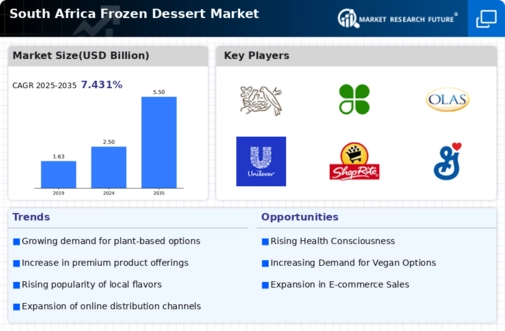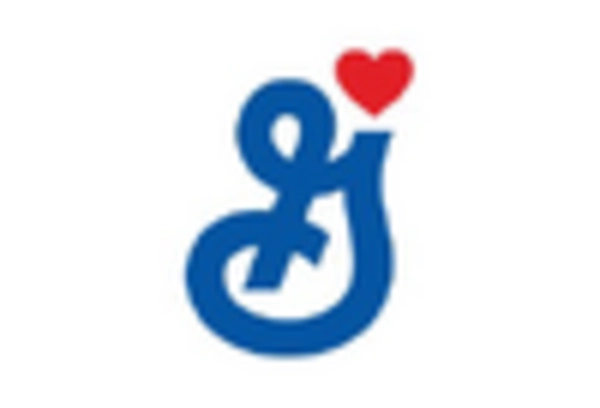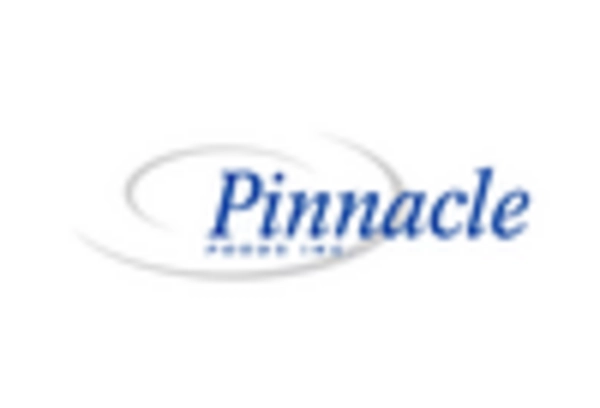Rising Disposable Incomes
The increasing disposable incomes in South Africa appear to be a significant driver for the frozen dessert market. As consumers have more financial flexibility, they are likely to indulge in premium frozen desserts, which often come with higher price points. This trend is reflected in the market data, indicating a growth rate of approximately 8% in the premium segment over the past year. The frozen dessert market is benefiting from this shift, as consumers are willing to spend more on quality and unique flavors. Additionally, the rise of middle-class households is contributing to a broader consumer base, further stimulating demand for diverse frozen dessert options. This economic uplift may lead to a sustained increase in sales, particularly in urban areas where disposable income levels are higher.
Innovative Flavor Profiles
Innovation in flavor profiles is emerging as a key driver in the frozen dessert market. South African consumers are increasingly seeking unique and exotic flavors, moving beyond traditional offerings. This trend is supported by Market Research Future indicating that approximately 30% of consumers are willing to try new flavors, which suggests a growing appetite for adventurous taste experiences. The frozen dessert market is responding by introducing products that incorporate local ingredients, such as rooibos and biltong, alongside international flavors. This not only caters to local preferences but also enhances the overall appeal of frozen desserts. As brands continue to innovate, they may capture a larger share of the market, appealing to both younger consumers and those looking for novel culinary experiences.
Increased Focus on Convenience
Convenience is becoming a pivotal factor influencing consumer choices in the frozen dessert market. With busy lifestyles, South African consumers are gravitating towards products that offer quick and easy solutions. This trend is evident in the rise of single-serve packaging and ready-to-eat frozen desserts, which have seen a growth of approximately 15% in sales over the last year. The frozen dessert market is adapting to this demand by enhancing distribution channels, including online platforms and retail partnerships. As convenience becomes a priority, brands that effectively market their products as time-saving options are likely to gain a competitive edge. This shift may also encourage impulse purchases, further driving sales in the frozen dessert sector.
Seasonal and Festive Promotions
Seasonal and festive promotions are playing a crucial role in driving sales within the frozen dessert market. South African consumers often indulge in frozen treats during holidays and special occasions, leading to spikes in demand. Market analysis shows that sales can increase by as much as 25% during festive seasons, particularly around summer holidays. The frozen dessert market capitalizes on this trend by launching limited-edition flavors and promotional campaigns that resonate with cultural celebrations. This strategy not only boosts sales but also enhances brand visibility and consumer engagement. As brands continue to leverage seasonal marketing, they may foster customer loyalty and encourage repeat purchases throughout the year.
Growing Demand for Dairy Alternatives
The increasing demand for dairy alternatives is reshaping the frozen dessert market landscape. As more consumers adopt plant-based diets or seek lactose-free options, the market for non-dairy frozen desserts is expanding. Recent data indicates that the non-dairy segment has experienced a growth rate of around 12% in South Africa, reflecting a shift in consumer preferences. The frozen dessert market is responding by developing innovative products made from almond, coconut, and oat bases, catering to this emerging demographic. This trend not only addresses dietary restrictions but also aligns with broader health and wellness movements. As awareness of plant-based diets continues to rise, the market may see further diversification in product offerings.

















